Massage spa abuse in Indianapolis (IN) is a growing concern with severe physical and mental health impacts, from chronic pain to PTSD. IN's wellness scene demands regulatory action and public awareness through licensed therapists' education. Specialized mental health services and support groups are vital for survivors' healing and community resilience against massage spa abuse.
In the vibrant city of Indianapolis, IN, understanding the long-term health consequences of massage spa abuse is crucial. This comprehensive guide delves into the various aspects of this pressing issue, drawing insights from top medical experts in the state. From the physical effects on the body and mind to the psychological trauma and recovery strategies, we explore how such abuses can leave lasting impacts. By shedding light on these challenges, we aim to foster awareness and promote safer practices within Indiana’s massage spa industry.
Understanding Massage Spa Abuse in IN

Massage spa abuse, a growing concern in Indianapolis (IN), refers to instances where individuals receive harmful or inappropriate treatments at massage spas. This can range from excessive pressure during massages, unlicensed practitioners, unsanitary conditions, and even sexual assault. IN residents often seek medical attention for related health issues, such as muscle strain, joint pain, and psychological trauma.
Indianapolis’s vibrant wellness scene, while beneficial, requires regulation and awareness. Medical experts in IN emphasize the importance of choosing licensed massage therapists and understanding one’s rights. By educating the public about massage spa abuse, IN can foster a healthier and safer environment for those seeking relaxation and recovery.
Long-Term Physical Effects on Body and Mind

The long-term health consequences of massage spa abuse can be profound, affecting both the physical and mental well-being of individuals in Indianapolis and across the state. Prolonged exposure to aggressive or inappropriate massage techniques can lead to chronic muscle pain, joint instability, and even nerve damage. These physical effects may persist for years, impacting a person’s mobility and overall quality of life.
On a mental health level, survivors of massage spa abuse often face an array of challenges. Post-traumatic stress disorder (PTSD), anxiety, and depression are common diagnoses, as the experience can be deeply traumatic. The mind-body connection is powerful, and the emotional distress caused by such experiences may manifest in physical symptoms, creating a complex interplay between mental and bodily health.
Psychological Trauma and Recovery Strategies

Massage spa abuse can leave profound psychological scars, with many survivors experiencing anxiety, depression, and post-traumatic stress disorder (PTSD). These conditions often manifest as physical symptoms such as chronic pain, headaches, and sleep disturbances. The healing process requires a multifaceted approach.
Therapy plays a pivotal role in helping individuals process their trauma and develop coping mechanisms. Incorporating techniques like cognitive behavioral therapy (CBT) and eye movement desensitization and reprocessing (EMDR), therapists enable survivors to reframe negative thoughts and memories, fostering emotional resilience. Additionally, support groups offer a safe space for sharing experiences, reducing feelings of isolation, and promoting peer-to-peer healing. In IN, access to specialized mental health services further empowers survivors on their path to recovery.





